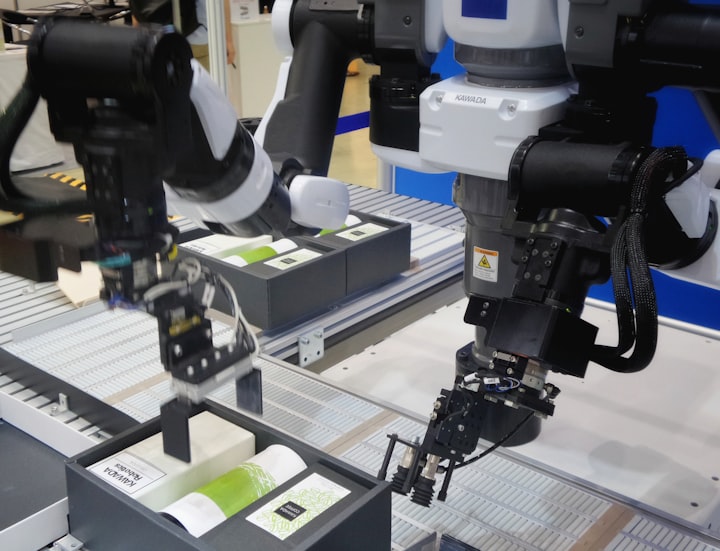The Role of Robotics in Industry 4.0
Automation's New Era

Industry 4.0 is a major turning point in the constantly changing environment of industry and technology. The confluence of digital technologies in this era has resulted in a notable revolution in the way industries function, with robotics playing a central part in this development.
Robotics is now the foundation of productivity and innovation in everything from assembly lines to complex manufacturing processes. The use of robotics into Industry 4.0 denotes a paradigm shift in how industries operate, maximize production, and adapt to ever-changing market demands, not only the employment of automated machinery.
Evolution of Robotics in Industry:
The development of automated devices intended to carry out repetitive activities marked the beginning of robotics' voyage in industry some decades ago. But with the introduction of Industry 4.0, the paradigm shifted, and robotics stopped being just instruments for automation and started to become intelligent systems that could adapt and learn.
Modern robots are capable of artificial intelligence (AI) and machine learning in addition to being programmed to carry out certain tasks. These developments enable them to operate harmoniously with human workers, analyze data, and make judgments. The mutually beneficial partnership between humans and robots is revolutionizing conventional labor processes, improving accuracy, and propelling increased output.
Impact on Manufacturing and Beyond:
Industry 4.0's use of robotics has far-reaching effects beyond traditional production. Because of the introduction of robotics, industries like healthcare, logistics, agriculture, and even entertainment have undergone revolutionary transformations.
Robots have simplified industrial procedures, allowing for quicker production cycles, a reduction in errors, and a guarantee of constant quality. Innovations like collaborative robotics (cobots), which operate alongside humans, have mitigated safety issues while increasing productivity.
Robots help in medical care, automate tedious activities in labs, and support surgeons during sensitive procedures. Precision medicine has been transformed by the use of robotic technologies, which has also increased the efficiency and accessibility of healthcare services.
Robotics has been widely adopted by the logistics industry to automate warehouses and accelerate order fulfillment, inventory control, and logistics procedures. Drones and autonomous cars have also advanced significantly, revolutionizing last-mile delivery services.
Precision crop management and automated harvesting are only two examples of how agricultural robotics has transformed farming operations. These developments have reduced resource waste while simultaneously improving yield and quality.
Challenges and Opportunities:
Even with the impressive advancements, there are still obstacles to overcome when incorporating robotics into Industry 4.0. For smaller businesses, the initial expense of using robotics can be prohibitive. Furthermore, two important issues that must be addressed are the workforce's need to reskill in order to adapt to this new era and the fear of losing one's job.
These difficulties do, yet, also offer chances for development and innovation. Governments, businesses, and academic institutions working together can speed up the creation of affordable robotic solutions. Furthermore, programs aimed at retraining and upskilling the labor force can facilitate a more seamless shift to the robotics and automation future.
The Future Landscape:
The state of robotics in Industry 4.0 seems bright going forward. Robotics will become much more capable as artificial intelligence, machine learning, and sensor technologies advance, giving them greater versatility and adaptability.
In some industries, the idea of "lights-out manufacturing," in which factories run on their own without human involvement, might come to pass. But this doesn't necessarily mean that human labor will be completely replaced; rather, it means that jobs will become more specialized and work in tandem with robotic technology.
It will also become more important to address ethical issues related to robots, such as maintaining accountability, transparency, and ethical AI development. It will be essential to address these ethical issues as robots become increasingly integrated in society in order to promote public acceptance and confidence.
Industry 4.0's emphasis on robots represents a significant change in how businesses function, develop, and prosper in a fiercely competitive global marketplace. Robotics integration has become essential, altering industries and redefining production processes.
It will be crucial that we embrace the potential of robotics while tackling the related issues as we traverse this new era. In addition to paving the path for technical improvements, cooperation, innovation, and a proactive approach to upskilling the workforce will guarantee a future in which people and robots coexist peacefully, promoting wealth and growth. Industry 4.0 ushers in a new era of technology power and human cognition working together, as well as the automation of tasks.
About the Creator
Dankuela_010000
I am a passionate writer dedicated to sharing my thoughts, experiences, and insights on a wide range of topics. I write to connect with readers, to inspire them, and to spark meaningful conversations messages and ideas efficiently.






Comments
There are no comments for this story
Be the first to respond and start the conversation.